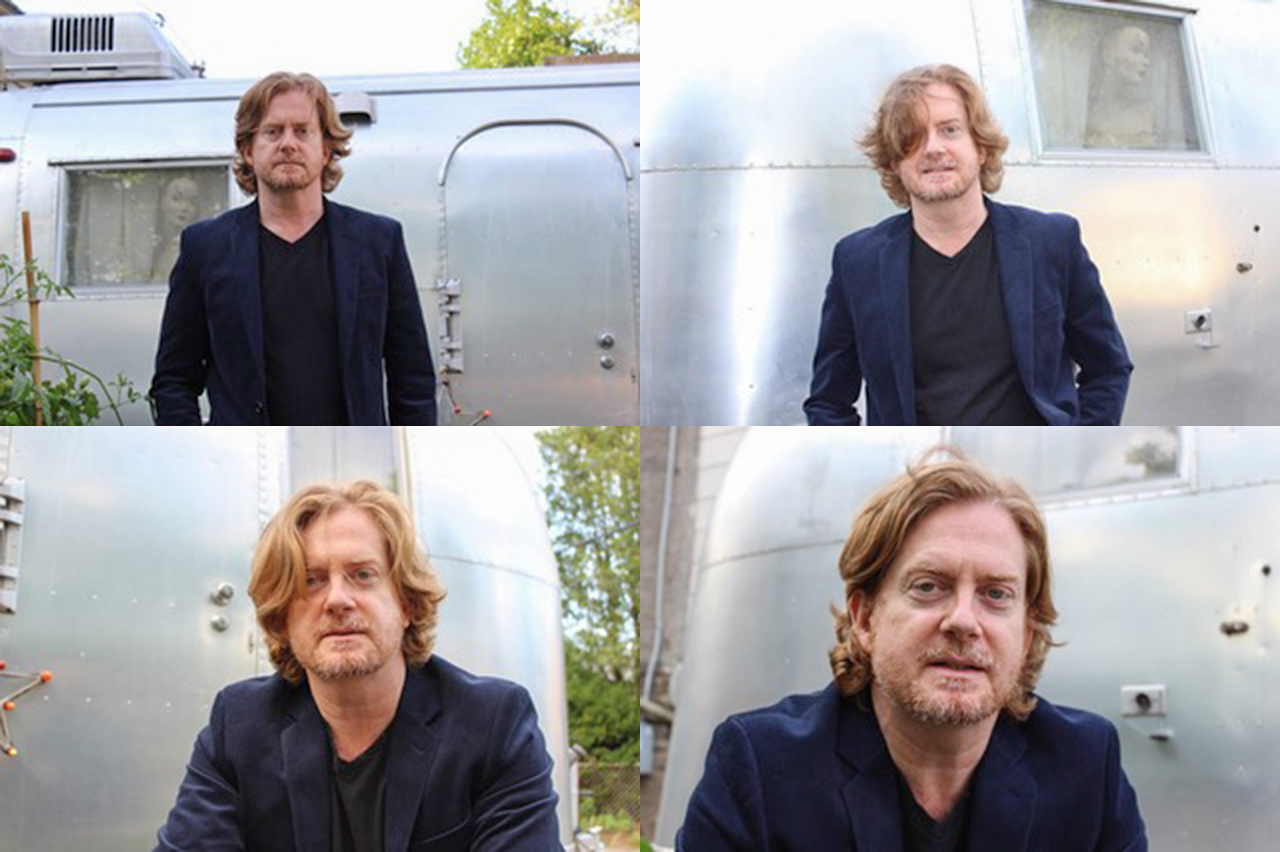Jay Kirk’s “Avoid The Day” Is a Psychedelic Ode to Escapism

Photo by Julie Diana
“You go see something, come home and write about it, and like, some people in New York read it,” shrugs journalist Jay Kirk, a veteran of narrative nonfiction whose latest book, Avoid the Day: A New Nonfiction in Two Movements, was released this week. Fatigued of late by the pro forma nature of the cosmopolitan magazine scene, the Vermont-born author has turned to new forms, namely ‘experimental nonfiction’— which he describes as “having the story generate the events, rather than having the events generate the story”— to reinvigorate his writing practice. Avoid the Day serves as a perfect calling card for this self-concocted genre: a surreal, benzodiazepine-and vodka-fueled joyride through Kirk’s frazzled psyche that traverses the desolate ice floes of the Arctic and the dusty trailer parks of Transylvania. The book flits from the Hungarian countryside, where Kirk reenacts the travels of renowned folk composer Béla Bartók for GQ, to a posh eco-cruise in the Arctic circle, where the he joins a filmmaker friend to produce a short horror film and (to attempt) to get clean. These seemingly unrelated creative pursuits share a singular purpose: to situate the author as far as possible from his childhood home, wedged between a looming sanatorium and a defunct quarry in rural Vermont, where his once-domineering father lies on his deathbed.
This feverish travel narrative, studded with alternating moments of self-interrogation and self-medication that leave the reader shuddering from the same tremors and throbbing headaches as the author himself, is characterized in equal measure by bursts of arresting tenderness and honesty. The result is a madcap portrait of a person trying—and at times succeeding—to evade a reckoning with his own troubled upbringing, and to numb the cavernous recesses of his own mind. What’s most haunting about Avoid the Day, which dazzles with topsy-turvy accounts of Romani funerals and near-spiritual polar bear sightings, is the fact that the book’s surrealist lens is little match for the funhouse mirror of our reality. In the middle of a blackout, down the street from an ATM blasted open by sticks of dynamite, Kirk took a moment to discuss the motivations behind his latest work, persistent themes of heavy bondage in Hungarian church art, the experience of desecrating a grave, and his must-pack items for polar exploration.
———
JAY KIRK: You know what happened last night, Mara?
MARA VEITCH: What?
KIRK: Someone threw half a stick of dynamite in the corner store a half block from my house. To blow up the ATM. Occasionally I venture over there to get a loosie. I went in in this morning and there was just this mangled ATM, but luckily the family who owns the place was okay.
VEITCH: I didn’t know dynamite still existed.
KIRK: Where did they get it? And do I need some? That’s the real question.
VEITCH: Where are you at the moment? How have the last few weeks treated you?
KIRK: Before the protests began, I’d fully immersed myself in a story for GQ about some of the, perhaps, silver linings that were emerging from the Great Pause we’re in. There was so much interesting data coming out, and it seemed like this could be the moment for us to make some serious environmental strides. I was also working on my next book, which is a form of escapism in itself. But those were simpler times.
VEITCH: Avoid the Day is described as “a work of experimental non-fiction.” What does that mean to you?
KIRK: I’ve been thinking a lot about how we write accurately about the world, and this tired notion that non-fiction is the only way to do that. I’ve become fatigued with the idea of regurgitating other people’s experiences and information, and somehow taping it together into a story. I wanted to create events, not just wait around for something to maybe happen, and then follow it around by the nose. The majority of my career has been focused on narrative non-fiction, you know, where you go experience something, come home and write about it, and like, some people in New York read it. I guess I got tired of my own “meaning apparatus”—god that sounds fucking pompous. I decided to try and explore new ways to generate meaning inside a story—having the story generate events more than events generating story, I guess.
VEITCH: As a lover of narrative non-fiction, I found it very uncomfortable to read at times. I think that’s a good thing.
KIRK: [Laughs] definitely. It should feel that way. There’s certainly a performative aspect to building this book which I really embraced; I wasn’t reporting passively on events as they happened, I had to set a series of events into motion and then perform inside them. Our plan to shoot the horror film on the cruise ship didn’t just happen to me, it took a shit load of work to create that situation. I really loved the element of artifice it involved. It was just fucking fun. It then gives me the opportunity to document my experience as it’s happening—it’s like an experiment you’re performing on yourself.
VEITCH: What became of the horror film you made on your cruise through the arctic?
KIRK: After two years of Darren and I pretty much not being friends (now we’re friends again), we wrote a whole new screenplay for it. Originally, we just filmed it so I could write about it, but we ended up having enough footage at the end—of the scenery, the fjords, the ice—to get some investors and really commit to it. I eventually walked away from it, but Darren made a completely new version, called Dissonance. There’s an animatronic seal in it. It’s going to be at festivals in the fall, if there are any festivals in the fall.
VEITCH: Avoid the Day is really a meditation on escapism. How have the events of recent months altered your approach to this idea?
KIRK: I guess escapism has no place in this time. One thing is just recognizing that we’re in the middle of a real pause from business as usual. When you add the protests to the pandemic, we have a real opportunity to recognize how our society functioned before, and to try and identify what needs to happen in order to make sure we never return to that—environmentally, socially, and pretty much every other way.
VEITCH: One of the driving forces in the novel is the fact that the theory of events that you sold your editor on blows up in your face. What do you do when a story falls apart, and it turns out that things are not as they appeared at the outset?
KIRK: I think there’s no such thing as falling apart. The original idea is never the most important part, so if it blows up, then that just becomes part of the story. It’s actually pretty liberating. Everyone really just wants to be surprised, readers and writers, so most of the time it actually helps your cause when things blow up. But, for sure, it’s always a gamble. Will something interesting happen?
VEITCH: Were there any close shaves from your travels that didn’t make their way into the book?
KIRK: The closest shave would have to be that I accidentally desecrated a grave. I was absolutely mortified. And Darren has it all on film! I look ridiculous. I’m all spaced out on my knees, with my notebook and my pen…not really listening to what the guide was saying…and just picking up these bones. [Laughs] Man, that was bad. I left it in the book because I’m a masochist.
VEITCH: And in Transylvania?
KIRK: We visited cemetery with a medieval wooden church. The inside was covered in paintings of these S&M, heavy bondage and chains situations. I’d never seen a church like that before, but I was like, you know, “right on.” But when we were leaving, there was this old woman in the cemetery with a long knife just stabbing at the ground. Over and over again. Transylvania is nuts, man.
VEITCH: What are some of Jay Kirk’s recommended travel items for a polar expedition?
KIRK: Oh, an axe. But like a silver axe, you know, Jack Nicholson style. You want it to look good. And the blood slides right off.
VEITCH: And Transylvania?
KIRK: Just don’t forget to bring your stakes.






